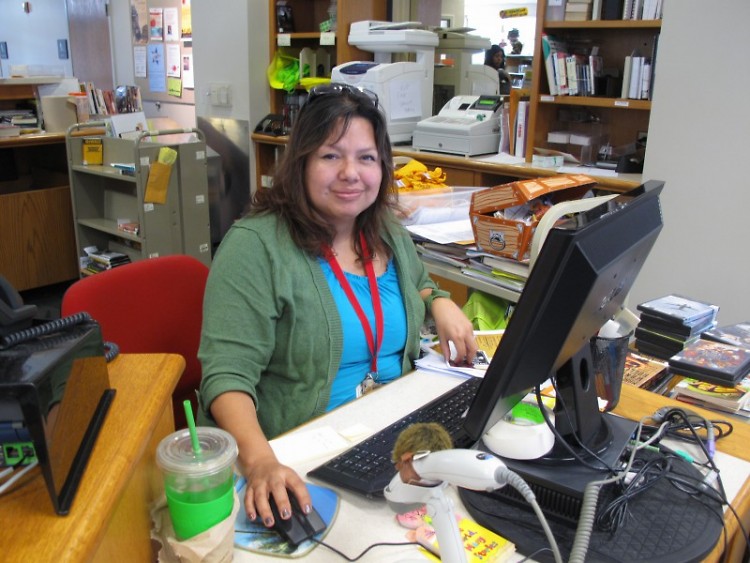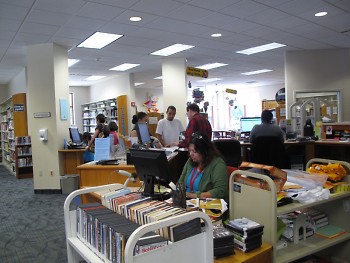Both Ashly and Denise had the chance to interview Madison Square branch manager Molly Rios on separate occasions before her last day on Aug. 13. Ashly is the lead on this article with Denise's interview supplementing her piece.
The beloved librarian Molly Rios, who has been working at the Madison Square Library branch (1201 Madison SE) for three and a half years, has left Grand Rapids Public Library to pursue a career opportunity as the manager of youth services at the Herrick District Library in Holland. For the years that she has been at the library, people have gotten to know her as the kindhearted woman who has always been there when you needed her. Molly was a hard worker and loved her job. I could tell because when you asked her a question, she would always answer it with a smile. Never have I seen her frown, that is, until the day she had to leave. And even after that, she was able to smile again.
Ashly: Do you think the library will be the same when you leave?
Molly: It would be different but just as good.
A: What things do you want to leave with the library?
M: That the people still feel safe and comfortable.
A: What will you be doing when you leave Madison Square?
M: I will be managing all youth services in the Herrick District Library in Holland.
Denise: How did you end up working at GRPL?
M: I actually—believe it or not—got a really great opportunity. I had been in Holland for seven years. I had put myself through library school, [and] I had graduated two weeks before and then Grand Rapids came calling. It's unheard of in libraries. Sometimes, just like in teaching, you get a lucky break, but otherwise you can be unemployed for a long time because otherwise the competition is fierce ... They needed someone with the right type of personality to work at Madison.
D: What was it like when you first got here?
M: It was pretty chaotic, and it was not a friendly, inviting environment. Gerald R. Ford [Middle School] had just opened, and we had a lot of problem behaviors in the neighborhood before the organizations and neighborhood associations got involved. Parents didn't want to stick around or bring their kids; single adults kind of avoided this place.
D: What things had you implemented to change things around?
M: The administration did simple things like change around the furniture. If you go behind the circ desk, you can actually see almost every area of the library because now we don't have blocked views of anything; you can pretty much see everything that's going on.
D: And everyone can see you, too.
M: Simple fixes that the administration put into place and being really supportive of the staff. We do have security a couple nights a week to help make sure that everybody knows that we have commitments to make sure everybody's feeling safe and welcome.
D: When you first got here, who was coming to the library?
M: Mostly misbehaving teens. Just walking on the way home, stopping in. The school really helped us out, their security—after they realized there was a a big problem—their security would come by through here and make sure the kids were going home first, checking in at home so that if they come back to the library, they're more likely to actually want to use the library and not just stop in and run after their friends and yell—things that are perfectly normal adolescent behavior, just not acceptable in a library.
D: Now who comes to the library?
M: Lots of great mixed groups. We get a lot of parents and kids, and we get a lot of elderly people using their laptops in the evenings and late afternoon. Lots of people in the magazine room with their laptops, and that was virtually unknown before. There didn't seem like there was [a big Hispanic population] so I don't know if they found out that everyone here on the desk speaks Spanish and so people feel more comfortable. Maybe [other branches] might have one on staff here or there, so that's pretty rare. We're actually getting more Spanish speakers now, not just predominantly the African-American community but a very good mixed community.
D: What do you feel like you're leaving your mark on as you head off?
M: I think a bigger sense of community, but like I said, I think a lot of other people in the neighborhood have gotten their act together as well, so it's really helped benefit the library. It's just way more inviting. We've got twice as much shelving for the teens, we have quite a few avid teen readers. So just the way it looks, and then the feel—that it's comfortable and inviting—but there's a lot of work behind it and you need to make sure that's a priority.
D: Who are your regulars you're going to be missing?
M: There are quite a few … In a fun way, I call them high-maintenance, but they really come in to check in and chit chat with the staff. You know how you get people who use self-checkout and they want to get in and get out? Our favorites are more like, it's kind of like going to Cheers, because everybody knows you there and you feel comfortable. It's kind of like, "hey I'm going to drop by and say hi to the guys, maybe pick up a CD," but they come in for the human interaction … We're a very relaxed atmosphere. You don't get the feeling that this is an academic library. Some of the libraries are so quiet and seem like they're so proper, and this is not that. We're definitely user friendly and way more casual.
D: Do you see people interacting with each other, too?
M: We've had huge increase in laptop use and huge increase in tutoring. People from The Literacy Center meet with their pupils here. Especially in the fall for some reason when school gets started, we have had groups of up to 15. Some days, we're running low on chairs… it's really great to see that.
D: What are some of the most memorable things for you that have happened here?
M: I love to get the compliment [from patrons] that they love coming to this library because they don't feel intimidated. Like, they feel like they're not dumb if they ask questions. They just love the feel that it's very casual and they don't feel out of place.
I'm already feeling like I'm going to really miss this place, we have some great, great patrons. Sometimes we do have problems, but for the most part, most of the people in the neighborhood are really fantastic. It's putting things into perspective, and I wish it were closer to home, but this is a completely different opportunity and it's a huge creative outlet, and I'll be in charge of everything going on around teens and kids, and I expect to do great things there, too. It's only been three and a half years, but you've seen them grown up. Little kids now in middle school, and you really do grow attached to your patrons. You come to work, and they know you, they come to see you. They rely on you to get them what they need, to get them their fix.
The Rapidian, a program of the 501(c)3 nonprofit Community Media Center, relies on the community’s support to help cover the cost of training reporters and publishing content.
We need your help.
If each of our readers and content creators who values this community platform help support its creation and maintenance, The Rapidian can continue to educate and facilitate a conversation around issues for years to come.
Please support The Rapidian and make a contribution today.


